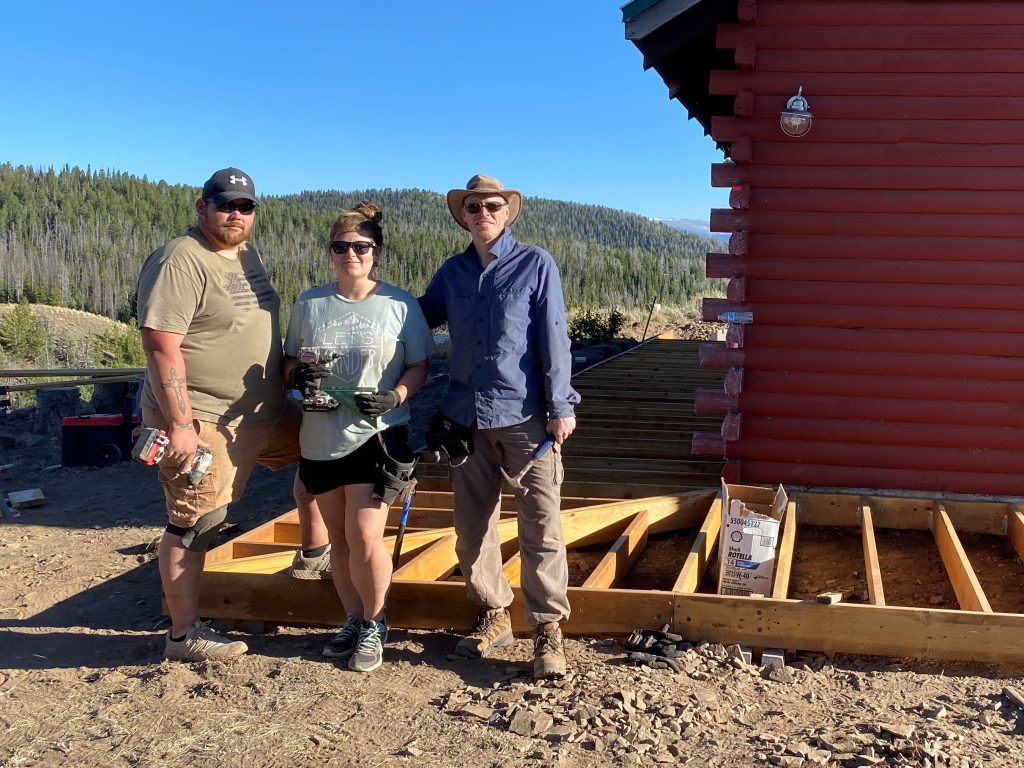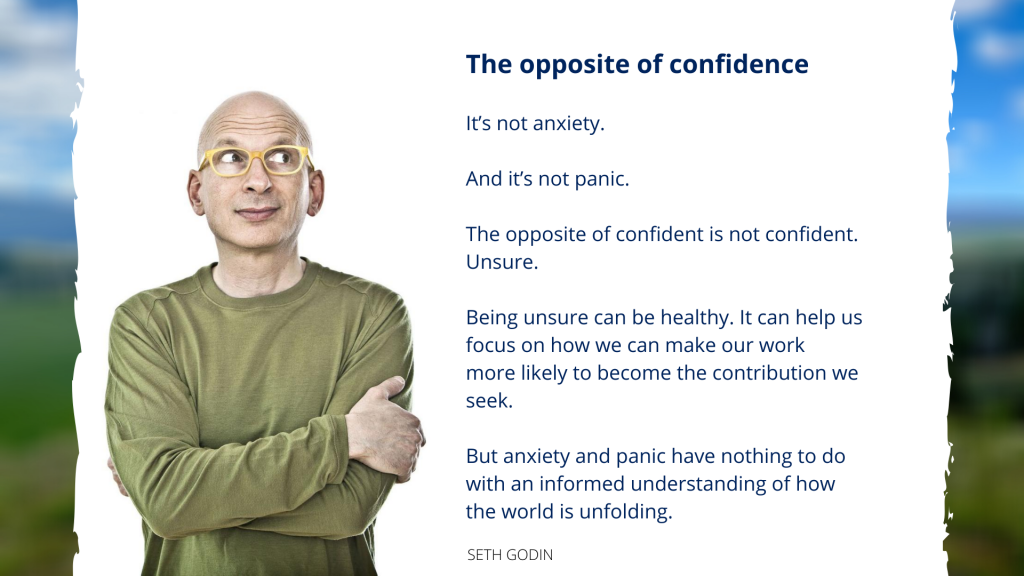“The greatest enemy of knowledge is not ignorance; it is the illusion of knowledge.” – Daniel J. Boorstin
No one could have predicted the rollercoaster we’ve experienced this year. From scary drops to tremendous rebounds, we’re reminded that diversifying your portfolio is a much sounder strategy than continually preparing for the worst case scenario.
Listen as we talk confidence, the past 3 quarters and finishing the year.
Transcript
Hi there. Mike Brady with Generosity Wealth Management, a comprehensive, full-service financial services firm headquartered in Boulder, Colorado. With today’s technology you can never tell when someone is standing in front of a green screen with a background and this is actually live. This is real. The reason why I chose this spot, I’m here in northern Wyoming at my cabin which you know that I do even though I’m having Zoom meetings with existing clients and potential clients all the time. I’m so proud of this deck. Felicia, my assistant, who so many of you have worked with, she and her husband came out for a week vacation and I put them to work. Her husband builds decks and fences for a living and this is really nice. You can see a decking board and then half a decking board. The pattern is really beautiful and I love it. You also see in the background it’s pretty gray and hazy. We are getting unbelievable smoke from California fires. I know in the front range you’re getting them from western Colorado and maybe from California as well but we are getting it big time from California and it’s all hazy. Otherwise, you’d be able to see some beautiful mountains there in the background.

Today I want to talk about where we are currently year-to-date, but I also want to talk about what lessons we can take from it. You’ve heard me in the past talk about emotions and the things that we can control, the things we can’t control, et cetera. And now that we’ve just come through a pretty difficult time, now is the time to reinforce and remember how we felt before, how we felt during and what we can take going forward.
First, a little bit of an update on where we are year-to-date. Stocks are up and bonds are up. I mean the unmanaged stock market indexes had a very hard time in February and March and I’m being kind when I say that. Every single day it seemed like it was newsworthy, a huge decline. Everybody in the world it seemed was freaking out and it felt like at the time when you look at the news that they’re projected that this is an apocalypse that will last forever and ever. If you look back at my videos from March which I was putting out practically every other day and definitely once a week, I said that I felt that it was an overreaction, it was an oversold situation, but I had humility. I didn’t know. I said let’s stay the course. Let’s remember what it is that we can control which is our portfolio, our diversification and let’s control our emotions. Nobody, including me, saw the huge rebound that we have seen in April, in May, in June, July and now in August. I’m recording this on Sunday morning, August 23, and I’m amazed at what has happened over the last four or five months to wipe away the declines that we saw in the unmanaged stock market indexes in February and in March.
The bonds are also up for the year. Bonds many times do opposite of what stocks do and they continued to do really well during the big decline. There was a flee to bonds in many situations, but stocks now have recovered and so stocks and bonds are both highly positive for the year, both of them being unmanaged indexes.
So what can we take from this? You’ve already heard me talk about our emotions, the importance of that. I was never in the military, but what I’ve read is that it is normal for a soldier going into battle to feel fear. That’s a human emotion. As a matter of fact, we don’t want soldiers who have no fear because they might do very unwise things. The true successful soldier is one who acknowledges that they have fear, but they move through it. They know how to control that particular fear.
Seth Godin is someone who I think very highly of. You’ve heard me talk about him in the past. One of the reasons why I like him is he articulates in a very nice way what I’m feeling and thinking but maybe I can’t articulate it as nicely as he does and maybe that’s why he’s a world famous author and blogger and I’m not. He wrote something that I want to read here word for word. It’s the opposite of confidence. The opposite of confidence. “It’s not anxiety. It’s not panic. The opposite of confident is not confident, it’s unsure. Being unsure can be healthy. It can help us focus on how we can make our work more likely to become the contribution we seek, but anxiety and panic have nothing to do with an informed understanding of how the world is unfolding.”

That, of course, leads me to the serenity prayer. God grant me the serenity
to accept the things I cannot change; courage to change the things I can;
and wisdom to know the difference. The reason why I bring this up is let’s focus on the things in the world that we can control. We control the portfolio that we create. We control how diversified we are. We don’t control certain things that we get so upset about and some people, I would say the unsuccessful investors, are those that allow their emotions to control themselves or stay up at night.
Right now we’re almost to September. September 1st is just a week away and some investors have the same portfolio meaning that they have the same – <<camera falls down> I’m going to move that back up, just move that down. That’s what happens when you have a windy day out here. <<camera adjusted back up>> We might be at the same situation, but some people had a pleasant ride and some worried the entire time. That worry was not helpful. Worry is fear about the future 95 percent, 99 percent of which never occurs. So let’s not worry. Let’s stick to our game and to the time true of diversification, having a portfolio, having the risk level that works for you that allows you to stick with the game because that’s what’s going to, in my opinion, allow you to be successful.
This is the way I like to think of it. We’re all at some point leaving our house and going to the grocery store. We’re all going to get there and 99.99 percent of us are going to get there without an accident. But some people might be so fearful of an accident that might happen. The probability is greater than zero. They’re looking at the worst case scenario. They entirely situate their life around the worst case scenario, obsess over the worst case scenario and they buy a tank. They are now more secure going from their house to the Safeway with that tank. But, you know what? They can’t complain if it’s very expensive, it takes them a long time to get there and the gas eats up all the gain. They’re going to be secure, but it’s going to take them a long time to get there. They have positioned themselves for that very, very unlikely situation that they’re going to have a catastrophic accident.
Others might be quite unwise, very foolish. They’re going to drive a convertible 100 miles an hour from their house to the grocery store. You know what? The truth is probably something in between. We all have seatbelts, we all have airbags. You’ve got to buy the car that you feel comfortable with, but you know what? Buying the car for the unlikely and positioning and, of course, the analogy is as we do our portfolio. Do we make a portfolio for only the worst case scenarios when historically if you have a diversified portfolio it doesn’t mean that you’re not going to have volatility. That does not mean that. But historically it has come back over time. If you position your entire portfolio around the worst case scenarios I just don’t think that’s a wise way to do it. If you allow your emotions to control your actions, short-term feelings to dictate your long-term vision, your long-term plan, I don’t think that’s very wise.
The reason why you’re my client is because I hit these points over and over again and when you might find yourself slipping it’s my job to remind you of what I’ve just talked about here right now. Warren Buffett always says to be “greedy when others are fearful and fearful when others are greedy.” Let’s remember that. I hit these points over and over again because when things are going well we have to remember yes, sometimes things go down, but we position ourselves, we create a fortress, we create the portfolio with the risk level so that you don’t have to make it up on the go. Other people are reading the news, watching the news and the purpose of that news and that newscaster is not always, in my opinion, to provide you with news. It’s to elicit emotion from you. And if that information doesn’t allow you to change that situation anyway, it’s useless information as far as I’m concerned. Use information. Use news that you can change. Use information that is helpful to you to make better decisions, not to elicit some emotional reaction from you.
Mike Brady, Generosity Wealth Management, 303-747-6455, call me anytime. Email me at any time, mike@generositywealth.com. I’d love to talk with you more about this. I’m probably going to stay up here. Frankly, all the clients, all of you are expecting Zoom meetings so I may as well just do them right here from my cabin. I’m going to put some more pictures of my lovely deck in the newsletter so be sure to check those out as well. Mike Brady, 303-747-6455. Have a wonderful week, a wonderful Labor Day. We’ll talk to you soon. Bye bye.
